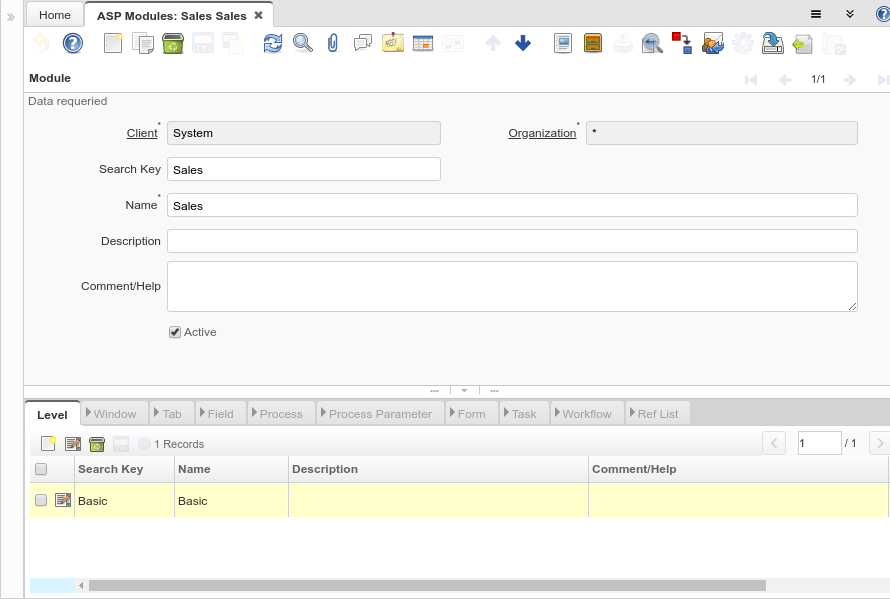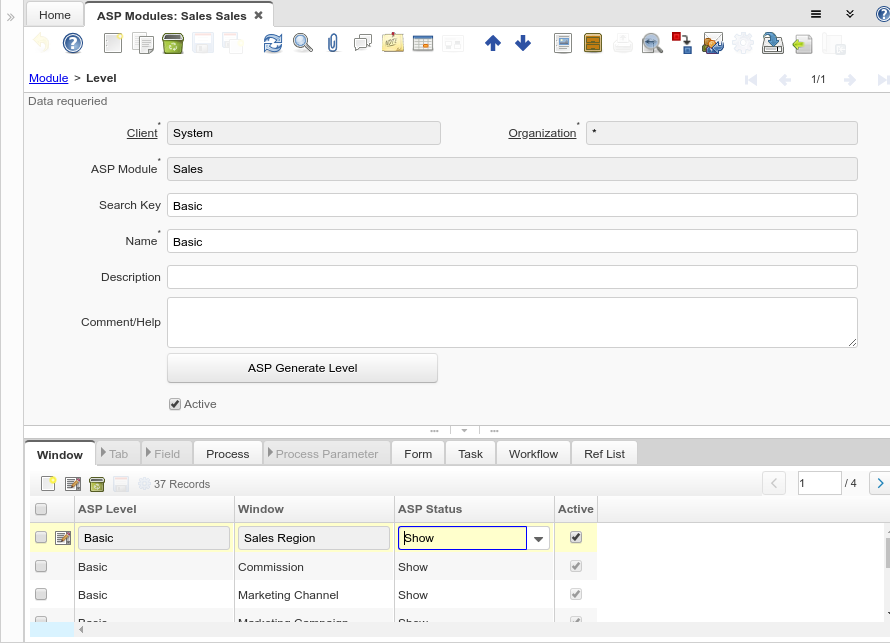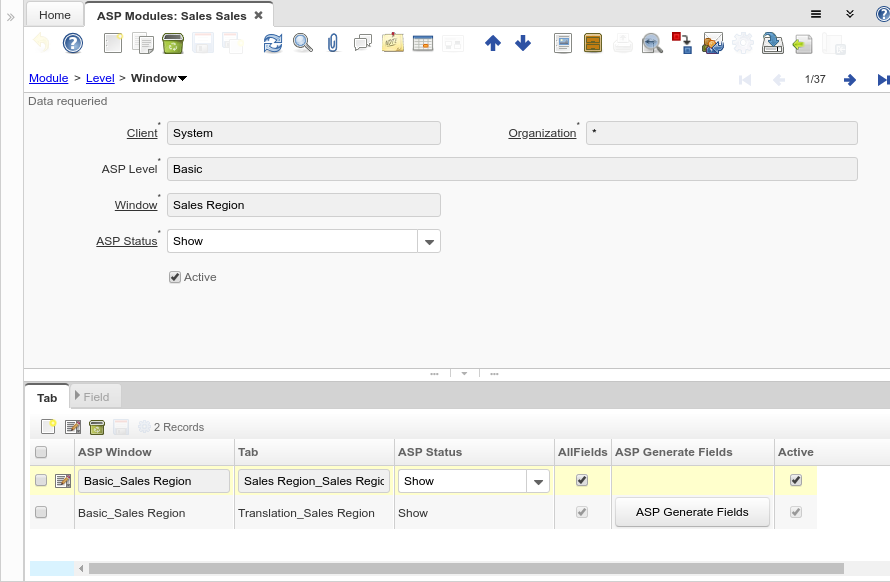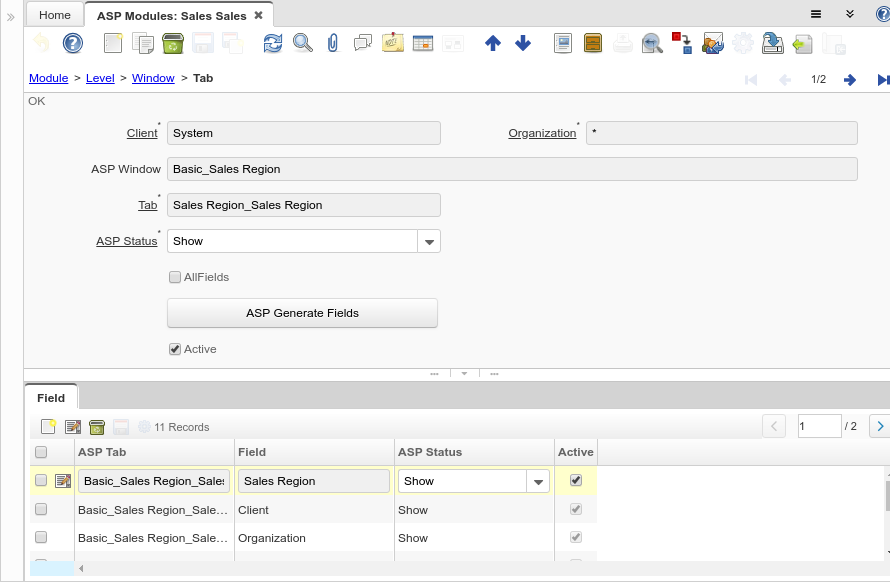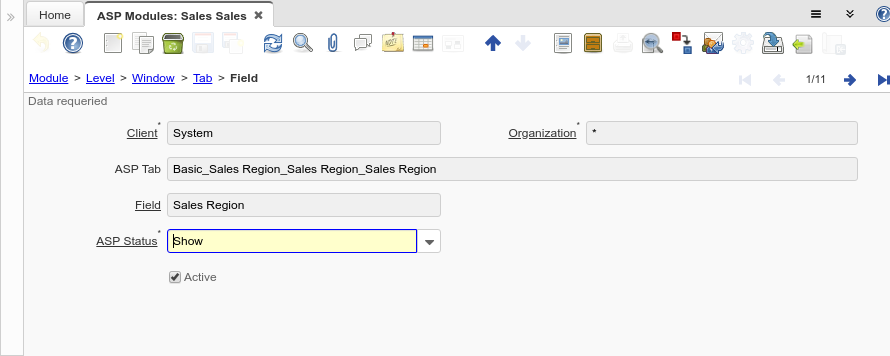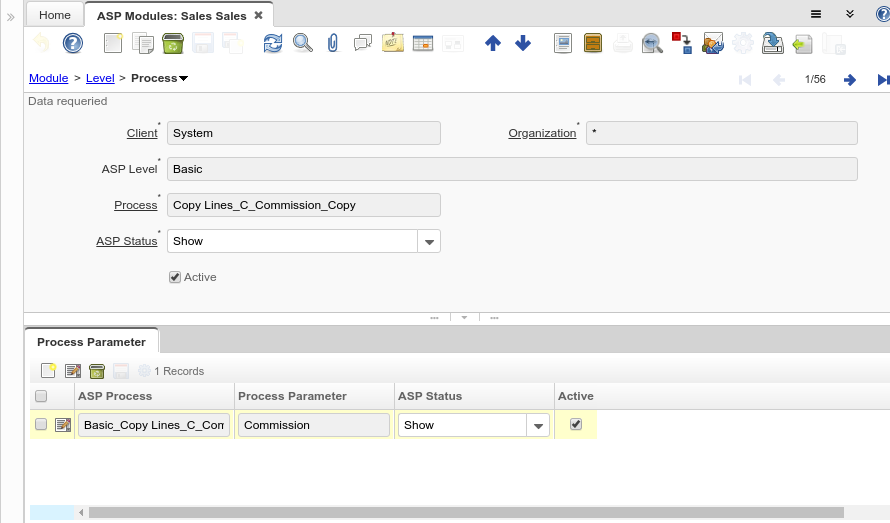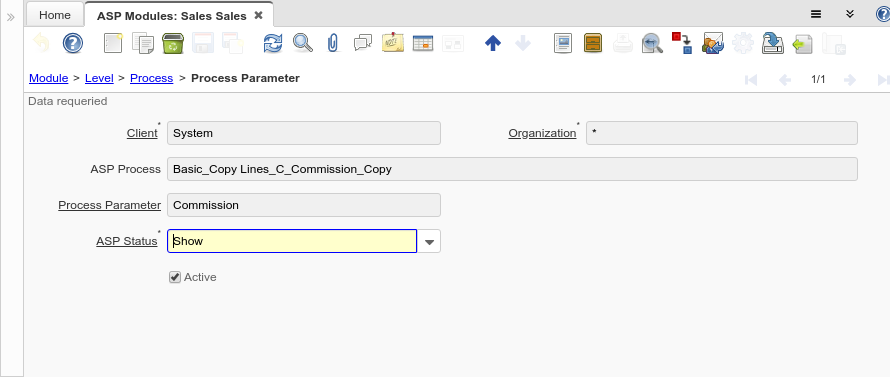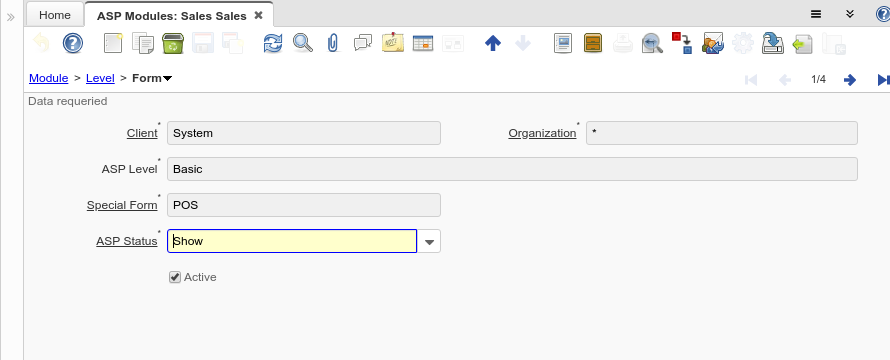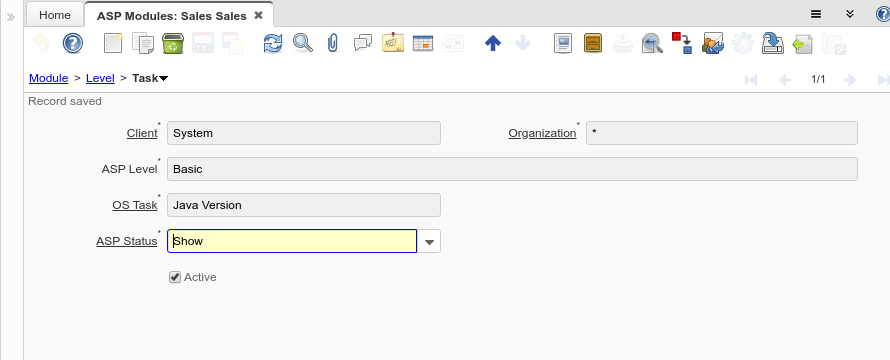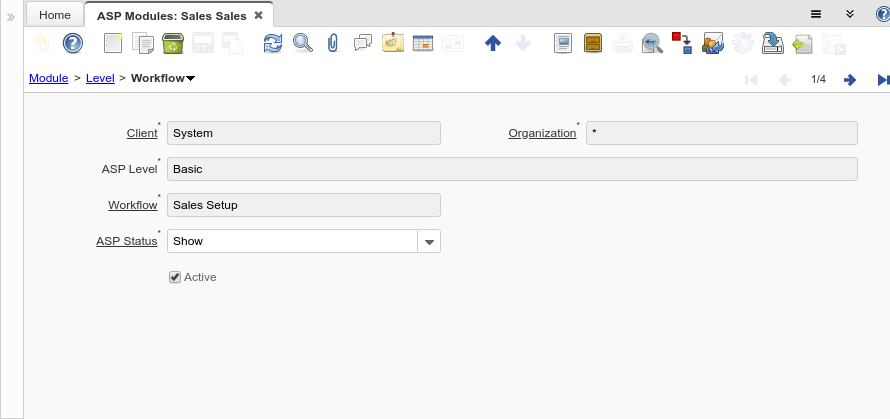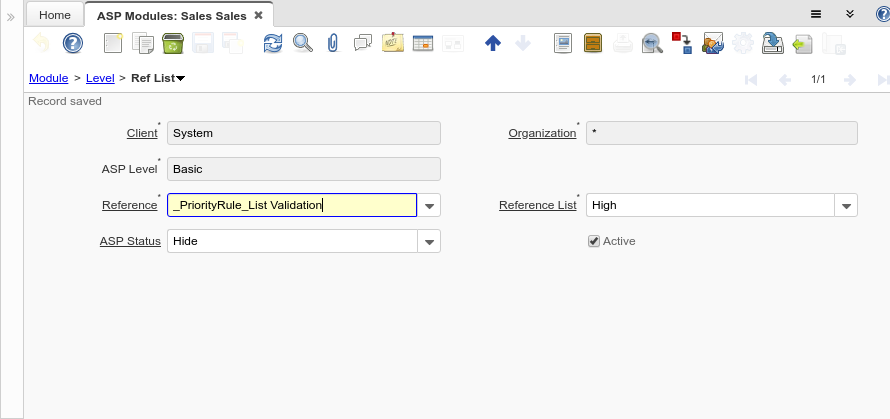ASP Modules (Window ID-53015)
Window: ASP Modules
Description:
Help:
Tab: Module
Description:
Help:
| Name | Description | Help | Technical Data |
|---|---|---|---|
| Tenant | Tenant for this installation. | A Tenant is a company or a legal entity. You cannot share data between Tenants. | ASP_Module.AD_Client_ID numeric(10) Table Direct |
| Organization | Organizational entity within tenant | An organization is a unit of your tenant or legal entity - examples are store, department. You can share data between organizations. | ASP_Module.AD_Org_ID numeric(10) Table Direct |
| Search Key | Search key for the record in the format required - must be unique | A search key allows you a fast method of finding a particular record.
If you leave the search key empty, the system automatically creates a numeric number. The document sequence used for this fallback number is defined in the "Maintain Sequence" window with the name "DocumentNo_<TableName>", where TableName is the actual name of the table (e.g. C_Order). |
ASP_Module.Value character varying(40) String |
| Name | Alphanumeric identifier of the entity | The name of an entity (record) is used as an default search option in addition to the search key. The name is up to 60 characters in length. | ASP_Module.Name character varying(60) String |
| Description | Optional short description of the record | A description is limited to 255 characters. | ASP_Module.Description character varying(255) String |
| Comment/Help | Comment or Hint | The Help field contains a hint, comment or help about the use of this item. | ASP_Module.Help character varying(2000) Text |
| Active | The record is active in the system | There are two methods of making records unavailable in the system: One is to delete the record, the other is to de-activate the record. A de-activated record is not available for selection, but available for reports.
There are two reasons for de-activating and not deleting records: (1) The system requires the record for audit purposes. (2) The record is referenced by other records. E.g., you cannot delete a Business Partner, if there are invoices for this partner record existing. You de-activate the Business Partner and prevent that this record is used for future entries. |
ASP_Module.IsActive character(1) Yes-No |
Tab: Level
Description:
Help:
| Name | Description | Help | Technical Data |
|---|---|---|---|
| Tenant | Tenant for this installation. | A Tenant is a company or a legal entity. You cannot share data between Tenants. | ASP_Level.AD_Client_ID numeric(10) Table Direct |
| Organization | Organizational entity within tenant | An organization is a unit of your tenant or legal entity - examples are store, department. You can share data between organizations. | ASP_Level.AD_Org_ID numeric(10) Table Direct |
| ASP Module | ASP_Level.ASP_Module_ID numeric(10) Table Direct | ||
| Search Key | Search key for the record in the format required - must be unique | A search key allows you a fast method of finding a particular record.
If you leave the search key empty, the system automatically creates a numeric number. The document sequence used for this fallback number is defined in the "Maintain Sequence" window with the name "DocumentNo_<TableName>", where TableName is the actual name of the table (e.g. C_Order). |
ASP_Level.Value character varying(40) String |
| Name | Alphanumeric identifier of the entity | The name of an entity (record) is used as an default search option in addition to the search key. The name is up to 60 characters in length. | ASP_Level.Name character varying(60) String |
| Description | Optional short description of the record | A description is limited to 255 characters. | ASP_Level.Description character varying(255) String |
| Comment/Help | Comment or Hint | The Help field contains a hint, comment or help about the use of this item. | ASP_Level.Help character varying(2000) Text |
| ASP Generate Level | ASP_Level.Processing character(1) Button | ||
| Active | The record is active in the system | There are two methods of making records unavailable in the system: One is to delete the record, the other is to de-activate the record. A de-activated record is not available for selection, but available for reports.
There are two reasons for de-activating and not deleting records: (1) The system requires the record for audit purposes. (2) The record is referenced by other records. E.g., you cannot delete a Business Partner, if there are invoices for this partner record existing. You de-activate the Business Partner and prevent that this record is used for future entries. |
ASP_Level.IsActive character(1) Yes-No |
Tab: Window
Description:
Help:
| Name | Description | Help | Technical Data |
|---|---|---|---|
| Tenant | Tenant for this installation. | A Tenant is a company or a legal entity. You cannot share data between Tenants. | ASP_Window.AD_Client_ID numeric(10) Table Direct |
| Organization | Organizational entity within tenant | An organization is a unit of your tenant or legal entity - examples are store, department. You can share data between organizations. | ASP_Window.AD_Org_ID numeric(10) Table Direct |
| ASP Level | ASP_Window.ASP_Level_ID numeric(10) Table Direct | ||
| Window | Data entry or display window | The Window field identifies a unique Window in the system. | ASP_Window.AD_Window_ID numeric(10) Table Direct |
| ASP Status | ASP_Window.ASP_Status character(1) List | ||
| Active | The record is active in the system | There are two methods of making records unavailable in the system: One is to delete the record, the other is to de-activate the record. A de-activated record is not available for selection, but available for reports.
There are two reasons for de-activating and not deleting records: (1) The system requires the record for audit purposes. (2) The record is referenced by other records. E.g., you cannot delete a Business Partner, if there are invoices for this partner record existing. You de-activate the Business Partner and prevent that this record is used for future entries. |
ASP_Window.IsActive character(1) Yes-No |
Tab: Tab
Description:
Help:
| Name | Description | Help | Technical Data |
|---|---|---|---|
| Tenant | Tenant for this installation. | A Tenant is a company or a legal entity. You cannot share data between Tenants. | ASP_Tab.AD_Client_ID numeric(10) Table Direct |
| Organization | Organizational entity within tenant | An organization is a unit of your tenant or legal entity - examples are store, department. You can share data between organizations. | ASP_Tab.AD_Org_ID numeric(10) Table Direct |
| ASP Window | ASP_Tab.ASP_Window_ID numeric(10) Table Direct | ||
| Tab | Tab within a Window | The Tab indicates a tab that displays within a window. | ASP_Tab.AD_Tab_ID numeric(10) Table Direct |
| ASP Status | ASP_Tab.ASP_Status character(1) List | ||
| All Fields | ASP_Tab.AllFields character(1) Yes-No | ||
| ASP Generate Fields | ASP_Tab.Processing character(1) Button | ||
| Active | The record is active in the system | There are two methods of making records unavailable in the system: One is to delete the record, the other is to de-activate the record. A de-activated record is not available for selection, but available for reports.
There are two reasons for de-activating and not deleting records: (1) The system requires the record for audit purposes. (2) The record is referenced by other records. E.g., you cannot delete a Business Partner, if there are invoices for this partner record existing. You de-activate the Business Partner and prevent that this record is used for future entries. |
ASP_Tab.IsActive character(1) Yes-No |
Tab: Field
Description:
Help:
| Name | Description | Help | Technical Data |
|---|---|---|---|
| Tenant | Tenant for this installation. | A Tenant is a company or a legal entity. You cannot share data between Tenants. | ASP_Field.AD_Client_ID numeric(10) Table Direct |
| Organization | Organizational entity within tenant | An organization is a unit of your tenant or legal entity - examples are store, department. You can share data between organizations. | ASP_Field.AD_Org_ID numeric(10) Table Direct |
| ASP Tab | ASP_Field.ASP_Tab_ID numeric(10) Table Direct | ||
| Field | Field on a database table | The Field identifies a field on a database table. | ASP_Field.AD_Field_ID numeric(10) Table Direct |
| ASP Status | ASP_Field.ASP_Status character(1) List | ||
| Active | The record is active in the system | There are two methods of making records unavailable in the system: One is to delete the record, the other is to de-activate the record. A de-activated record is not available for selection, but available for reports.
There are two reasons for de-activating and not deleting records: (1) The system requires the record for audit purposes. (2) The record is referenced by other records. E.g., you cannot delete a Business Partner, if there are invoices for this partner record existing. You de-activate the Business Partner and prevent that this record is used for future entries. |
ASP_Field.IsActive character(1) Yes-No |
Tab: Process
Description:
Help:
| Name | Description | Help | Technical Data |
|---|---|---|---|
| Tenant | Tenant for this installation. | A Tenant is a company or a legal entity. You cannot share data between Tenants. | ASP_Process.AD_Client_ID numeric(10) Table Direct |
| Organization | Organizational entity within tenant | An organization is a unit of your tenant or legal entity - examples are store, department. You can share data between organizations. | ASP_Process.AD_Org_ID numeric(10) Table Direct |
| ASP Level | ASP_Process.ASP_Level_ID numeric(10) Table Direct | ||
| Process | Process or Report | The Process field identifies a unique Process or Report in the system. | ASP_Process.AD_Process_ID numeric(10) Table Direct |
| ASP Status | ASP_Process.ASP_Status character(1) List | ||
| Active | The record is active in the system | There are two methods of making records unavailable in the system: One is to delete the record, the other is to de-activate the record. A de-activated record is not available for selection, but available for reports.
There are two reasons for de-activating and not deleting records: (1) The system requires the record for audit purposes. (2) The record is referenced by other records. E.g., you cannot delete a Business Partner, if there are invoices for this partner record existing. You de-activate the Business Partner and prevent that this record is used for future entries. |
ASP_Process.IsActive character(1) Yes-No |
Tab: Process Parameter
Description:
Help:
| Name | Description | Help | Technical Data |
|---|---|---|---|
| Tenant | Tenant for this installation. | A Tenant is a company or a legal entity. You cannot share data between Tenants. | ASP_Process_Para.AD_Client_ID numeric(10) Table Direct |
| Organization | Organizational entity within tenant | An organization is a unit of your tenant or legal entity - examples are store, department. You can share data between organizations. | ASP_Process_Para.AD_Org_ID numeric(10) Table Direct |
| ASP Process | ASP_Process_Para.ASP_Process_ID numeric(10) Table Direct | ||
| Process Parameter | ASP_Process_Para.AD_Process_Para_ID numeric(10) Table Direct | ||
| ASP Status | ASP_Process_Para.ASP_Status character(1) List | ||
| Active | The record is active in the system | There are two methods of making records unavailable in the system: One is to delete the record, the other is to de-activate the record. A de-activated record is not available for selection, but available for reports.
There are two reasons for de-activating and not deleting records: (1) The system requires the record for audit purposes. (2) The record is referenced by other records. E.g., you cannot delete a Business Partner, if there are invoices for this partner record existing. You de-activate the Business Partner and prevent that this record is used for future entries. |
ASP_Process_Para.IsActive character(1) Yes-No |
Tab: Form
Description:
Help:
| Name | Description | Help | Technical Data |
|---|---|---|---|
| Tenant | Tenant for this installation. | A Tenant is a company or a legal entity. You cannot share data between Tenants. | ASP_Form.AD_Client_ID numeric(10) Table Direct |
| Organization | Organizational entity within tenant | An organization is a unit of your tenant or legal entity - examples are store, department. You can share data between organizations. | ASP_Form.AD_Org_ID numeric(10) Table Direct |
| ASP Level | ASP_Form.ASP_Level_ID numeric(10) Table Direct | ||
| Special Form | Special Form | The Special Form field identifies a unique Special Form in the system. | ASP_Form.AD_Form_ID numeric(10) Table Direct |
| ASP Status | ASP_Form.ASP_Status character(1) List | ||
| Active | The record is active in the system | There are two methods of making records unavailable in the system: One is to delete the record, the other is to de-activate the record. A de-activated record is not available for selection, but available for reports.
There are two reasons for de-activating and not deleting records: (1) The system requires the record for audit purposes. (2) The record is referenced by other records. E.g., you cannot delete a Business Partner, if there are invoices for this partner record existing. You de-activate the Business Partner and prevent that this record is used for future entries. |
ASP_Form.IsActive character(1) Yes-No |
Tab: Task
Description:
Help:
| Name | Description | Help | Technical Data |
|---|---|---|---|
| Tenant | Tenant for this installation. | A Tenant is a company or a legal entity. You cannot share data between Tenants. | ASP_Task.AD_Client_ID numeric(10) Table Direct |
| Organization | Organizational entity within tenant | An organization is a unit of your tenant or legal entity - examples are store, department. You can share data between organizations. | ASP_Task.AD_Org_ID numeric(10) Table Direct |
| ASP Level | ASP_Task.ASP_Level_ID numeric(10) Table Direct | ||
| OS Task | Operation System Task | The Task field identifies a Operation System Task in the system. | ASP_Task.AD_Task_ID numeric(10) Table Direct |
| ASP Status | ASP_Task.ASP_Status character(1) List | ||
| Active | The record is active in the system | There are two methods of making records unavailable in the system: One is to delete the record, the other is to de-activate the record. A de-activated record is not available for selection, but available for reports.
There are two reasons for de-activating and not deleting records: (1) The system requires the record for audit purposes. (2) The record is referenced by other records. E.g., you cannot delete a Business Partner, if there are invoices for this partner record existing. You de-activate the Business Partner and prevent that this record is used for future entries. |
ASP_Task.IsActive character(1) Yes-No |
Tab: Workflow
Description:
Help:
| Name | Description | Help | Technical Data |
|---|---|---|---|
| Tenant | Tenant for this installation. | A Tenant is a company or a legal entity. You cannot share data between Tenants. | ASP_Workflow.AD_Client_ID numeric(10) Table Direct |
| Organization | Organizational entity within tenant | An organization is a unit of your tenant or legal entity - examples are store, department. You can share data between organizations. | ASP_Workflow.AD_Org_ID numeric(10) Table Direct |
| ASP Level | ASP_Workflow.ASP_Level_ID numeric(10) Table Direct | ||
| Workflow | Workflow or combination of tasks | The Workflow field identifies a unique Workflow in the system. | ASP_Workflow.AD_Workflow_ID numeric(10) Table Direct |
| ASP Status | ASP_Workflow.ASP_Status character(1) List | ||
| Active | The record is active in the system | There are two methods of making records unavailable in the system: One is to delete the record, the other is to de-activate the record. A de-activated record is not available for selection, but available for reports.
There are two reasons for de-activating and not deleting records: (1) The system requires the record for audit purposes. (2) The record is referenced by other records. E.g., you cannot delete a Business Partner, if there are invoices for this partner record existing. You de-activate the Business Partner and prevent that this record is used for future entries. |
ASP_Workflow.IsActive character(1) Yes-No |
Tab: Ref List
Description:
Help:
| Name | Description | Help | Technical Data |
|---|---|---|---|
| Tenant | Tenant for this installation. | A Tenant is a company or a legal entity. You cannot share data between Tenants. | ASP_Ref_List.AD_Client_ID numeric(10) Table Direct |
| Organization | Organizational entity within tenant | An organization is a unit of your tenant or legal entity - examples are store, department. You can share data between organizations. | ASP_Ref_List.AD_Org_ID numeric(10) Table Direct |
| ASP Level | ASP_Ref_List.ASP_Level_ID numeric(10) Table Direct | ||
| Reference | System Reference and Validation | The Reference could be a display type, list or table validation. | ASP_Ref_List.AD_Reference_ID numeric(10) Table Direct |
| Reference List | Reference List based on Table | The Reference List field indicates a list of reference values from a database tables. Reference lists populate drop down list boxes in data entry screens | ASP_Ref_List.AD_Ref_List_ID numeric(10) Table Direct |
| ASP Status | ASP_Ref_List.ASP_Status character(1) List | ||
| Active | The record is active in the system | There are two methods of making records unavailable in the system: One is to delete the record, the other is to de-activate the record. A de-activated record is not available for selection, but available for reports.
There are two reasons for de-activating and not deleting records: (1) The system requires the record for audit purposes. (2) The record is referenced by other records. E.g., you cannot delete a Business Partner, if there are invoices for this partner record existing. You de-activate the Business Partner and prevent that this record is used for future entries. |
ASP_Ref_List.IsActive character(1) Yes-No |

